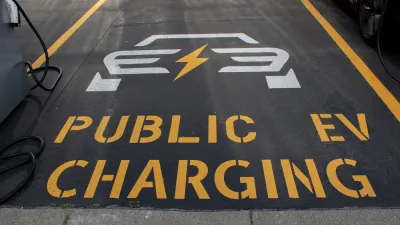I was reading Wendell Cox's recent attack on the Center for Neighborhood Technology's affordability calculations, and was struck by one thing he wrote:“transportation costs will be reduced in the future by the far more fuel efficient vehicles being required by Washington.”* In other words, don't worry about Americans being impoverished by the cost of a car for every man, woman, and 16-year old in the House: the technological miracle of fuel efficiency will save us.
I was reading Wendell Cox's recent attack on the Center for Neighborhood Technology's affordability calculations, and was struck by one thing he wrote:"transportation costs will be reduced in the future by the
far more fuel efficient vehicles being required by Washington."*
In other words, don't worry about Americans being impoverished by the cost of a car for every man, woman, and 16-year old in the House: the technological miracle of fuel efficiency will save us.
Now, this argument has a grain of truth: new EPA regulations will require the average vehicle to get 35 miles per gallon by 2016**, so cars will become somewhat more fuel efficient if next year's Republican Congress or the federal courts don't get in the way. But even so, the benefits of fuel efficiency may be canceled out by gasoline price rises - and even if they don't, gasoline costs comprise only about 30 percent of vehicle-related expenses. In 2007 the average household spent $2384 on gasoline and motor oil, $3244 on car purchases, and $2592 on other vehicle-related expenses.***
I have seen the same argument raised to deflate concerns about automobile-related air pollution or greenhouse gas emissions: even if pollution is a problem today, tomorrow's Wonder Cars of the Future will drive the problem away. For example, one blog writes: "The widespread availability of electric cars will make one argument made
by transit proponents harder to advance: that riding trains and buses
is better for the environment."*****
But it is not just the defenders of the sprawl status quo who rely on hoped-for technological change to support their views.
Critics of sprawl often argue that sprawl is doomed because of Peak Oil. According to this argument, supplies of oil will become unreliable, and the Peak Oil Fairy will slay the dragons of unsustainable development. One recently published book summarizes the theory: "Why Your World Is About To Get A Whole Lot Smaller."
To be fair, one or both of these arguments could be true. It is possible that 100 mile-per-gallon cars will revolutionize American transportion. It is also possible that scarce or expensive gasoline could revolutionize American transportation.
But maybe not -and it seems to me that a technological change that hasn't happened yet isn't a particularly strong argument for any public policy.
*http://www.newgeography.com/content/001526-the-muddled-cnt-housing-and-… .
**http://www.fastcompany.com/1604219/obama-sets-new-fuel-efficiency-stand…
*** http://www.census.gov/compendia/statab/2010/tables/10s0668.pdf
****http://www.thetransportpolitic.com/2010/03/31/whos-afraid-of-the-electr…

Trump Administration Could Effectively End Housing Voucher Program
Federal officials are eyeing major cuts to the Section 8 program that helps millions of low-income households pay rent.

Planetizen Federal Action Tracker
A weekly monitor of how Trump’s orders and actions are impacting planners and planning in America.

Ken Jennings Launches Transit Web Series
The Jeopardy champ wants you to ride public transit.

Washington Legislature Passes Rent Increase Cap
A bill that caps rent increases at 7 percent plus inflation is headed to the governor’s desk.

From Planning to Action: How LA County Is Rethinking Climate Resilience
Chief Sustainability Officer Rita Kampalath outlines the County’s shift from planning to implementation in its climate resilience efforts, emphasizing cross-departmental coordination, updated recovery strategies, and the need for flexible funding.

New Mexico Aging Department Commits to Helping Seniors Age ‘In Place’ and ‘Autonomously’ in New Draft Plan
As New Mexico’s population of seniors continues to grow, the state’s aging department is proposing expanded initiatives to help seniors maintain their autonomy while also supporting family caregivers.
Urban Design for Planners 1: Software Tools
This six-course series explores essential urban design concepts using open source software and equips planners with the tools they need to participate fully in the urban design process.
Planning for Universal Design
Learn the tools for implementing Universal Design in planning regulations.
Heyer Gruel & Associates PA
Ada County Highway District
Institute for Housing and Urban Development Studies (IHS)
City of Grandview
Harvard GSD Executive Education
Toledo-Lucas County Plan Commissions
Salt Lake City
NYU Wagner Graduate School of Public Service






























